英语语法讲解-代词
英语语法--代词
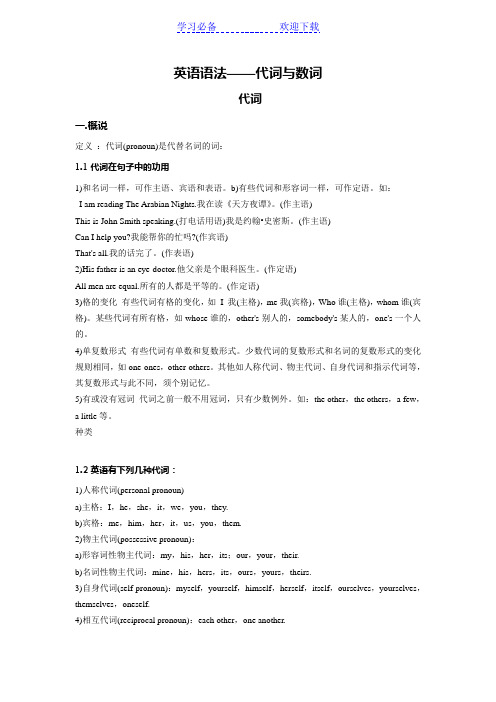
英语语法——代词与数词代词一.概说定义:代词(pronoun)是代替名词的词:1.1代词在句子中的功用1)和名词一样,可作主语、宾语和表语。
b)有些代词和形容词一样,可作定语。
如:I am reading The Arabian Nights.我在读《天方夜谭》。
(作主语)This is John Smith speaking.(打电话用语)我是约翰•史密斯。
(作主语)Can I help you?我能帮你的忙吗?(作宾语)That's all.我的话完了。
(作表语)2)His father is an eye-doctor.他父亲是个眼科医生。
(作定语)All men are equal.所有的人都是平等的。
(作定语)3)格的变化有些代词有格的变化,如I 我(主格),me我(宾格),Who谁(主格),whom谁(宾格)。
某些代词有所有格,如whose谁的,other's别人的,somebody's某人的,one's一个人的。
4)单复数形式有些代词有单数和复数形式。
少数代词的复数形式和名词的复数形式的变化规则相同,如one-ones,other-others。
其他如人称代词、物主代词、自身代词和指示代词等,其复数形式与此不同,须个别记忆。
5)有或没有冠词代词之前一般不用冠词,只有少数例外。
如:the other,the others,a few,a little等。
种类1.2英语有下列几种代词:1)人称代词(personal pronoun)a)主格:I,he,she,it,we,you,they.b)宾格:me,him,her,it,us,you,them.2)物主代词(possessive pronoun):a)形容词性物主代词:my,his,her,its;our,your,their.b)名词性物主代词:mine,his,hers,its,ours,yours,theirs.3)自身代词(self-pronoun):myself,yourself,himself,herself,itself,ourselves,yourselves,themselves,oneself.4)相互代词(reciprocal pronoun):each other,one another.5)指示代词(demonstrative pronoun):this,that,these,those,such,same.6)疑问代词(interrogative pronoun):who,whom,whose,which,what.7)关系代词(relative pronoun):who,whom,whose,which,that.8)不定代词(indefinite pronoun):some,something,somebody,someone,any,anything,anybody,anyone,no,nothing,nobody,no one,every,everything,everybody,everyone,each,much,many,little,a little,few,a few,other,another,all,none,one,both,either,neither.二.人称代词概说表示"我',、"你"、"他"、"我们"、"你们"、"他们"等的词,叫做人称代词。
高中英语语法之代词概述及各类代词用法讲义
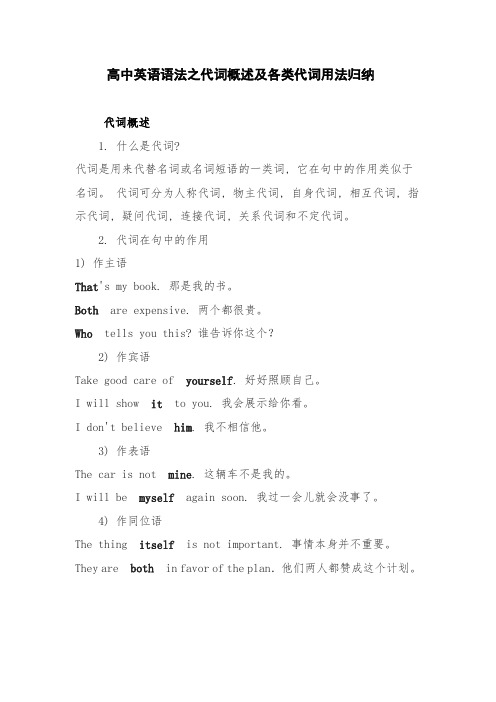
高中英语语法之代词概述及各类代词用法归纳代词概述1. 什么是代词?代词是用来代替名词或名词短语的一类词, 它在句中的作用类似于名词。
代词可分为人称代词, 物主代词, 自身代词, 相互代词, 指示代词, 疑问代词, 连接代词, 关系代词和不定代词。
2. 代词在句中的作用1) 作主语That's my book. 那是我的书。
Both are expensive. 两个都很贵。
Who tells you this? 谁告诉你这个?2) 作宾语Take good care of yourself. 好好照顾自己。
I will show it to you. 我会展示给你看。
I don't believe him. 我不相信他。
3) 作表语The car is not mine. 这辆车不是我的。
I will be myself again soon. 我过一会儿就会没事了。
4) 作同位语The thing itself is not important. 事情本身并不重要。
They are both in favor of the plan.他们两人都赞成这个计划。
5) 作呼语You stand here and wait for the bus. 你站在这儿等公车吧。
Be patient, everyone. 大家都耐心点吧。
6) 作定语That's my glasses. 那是我的眼镜。
I'll buy that umbrella.人称代词1. 人称代词的词汇a) 人称代词主格 (在句中作主语)单数第一人称: I (我)单数第二人称: you (你)单数第三人称: he, she, it (他,她,它)复数第一人称: we(我们)复数第二人称: you(你们)复数第三人称: they (他们/她们/它们)b) 人称代词宾格 (在句中作宾语)单数第一人称: me (我)单数第二人称: you (你)单数第三人称: him, her, it(他,她,它)复数第一人称: us(我们)复数第二人称: you(你们)复数第三人称: them (他们/她们/它们)2. 人称代词在句中的作用1) 作主语I am a student. 我是一名学生。
英语语法代词
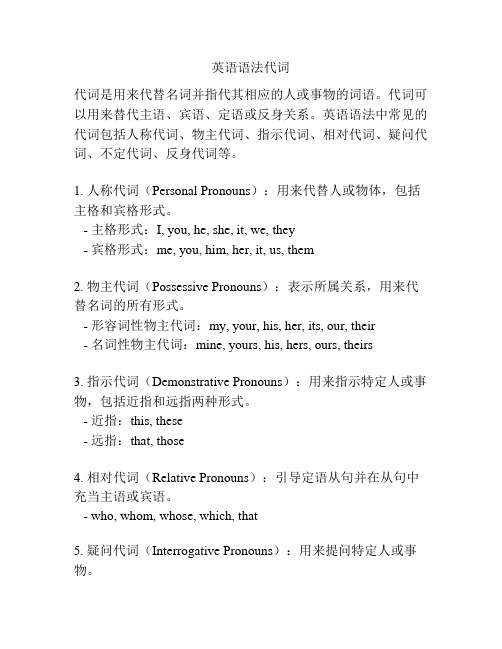
英语语法代词代词是用来代替名词并指代其相应的人或事物的词语。
代词可以用来替代主语、宾语、定语或反身关系。
英语语法中常见的代词包括人称代词、物主代词、指示代词、相对代词、疑问代词、不定代词、反身代词等。
1. 人称代词(Personal Pronouns):用来代替人或物体,包括主格和宾格形式。
- 主格形式:I, you, he, she, it, we, they- 宾格形式:me, you, him, her, it, us, them2. 物主代词(Possessive Pronouns):表示所属关系,用来代替名词的所有形式。
- 形容词性物主代词:my, your, his, her, its, our, their- 名词性物主代词:mine, yours, his, hers, ours, theirs3. 指示代词(Demonstrative Pronouns):用来指示特定人或事物,包括近指和远指两种形式。
- 近指:this, these- 远指:that, those4. 相对代词(Relative Pronouns):引导定语从句并在从句中充当主语或宾语。
- who, whom, whose, which, that5. 疑问代词(Interrogative Pronouns):用来提问特定人或事物。
- who, whom, whose, which, what6. 不定代词(Indefinite Pronouns):指代不确定人或物体的代词。
- some, any, no, all, each, every, few, many, several, someone, anyone, no one, everyone, etc.7. 反身代词(Reflexive Pronouns):表示动作的反身关系。
- myself, yourself, himself, herself, itself, ourselves, yourselves, themselves以上是英语语法中常见的代词,它们在句子中扮演着重要的角色,可以使句子更加简洁明了。
小学英语语法-代词

小学英语语法-代词代词是代替名词的词类。
绝大部分代词具有名词和形容词的功能。
英语中的代词能够分为九类:人称代词、物主代词、反身代词、相互代词、指示代词、疑问代词、关系代词、连接代词和不定代词。
一、人称代词1、人称代词是表示"我"、"你"、"他"、"她"、"它"、"我们"、"你们"、"他们"的词。
人称代词有人称、数和格的变化,见下表:单数复数格主格宾格主格宾格第一人称 I me we us第二人称 you you you you第三人称 he him they themshe her they themit it they them2、人称代词的用法(1)代词作主语时用主格,作宾语时用宾格:He has great concern for them. 他很关心他们。
They all like him very much. 他们都很喜欢他。
She gave the books to you and me. 这些书是她送给你和我的。
(2)人称代词作表语时,用宾格时较多,特别是在口语中,例如:Who is knocking at the door?-It’s me. 谁敲门?-是我。
If I were her, I would take the advice. 我要是她就接收这个意见。
Imagine yourself to be me. 设想你是我。
但在下面这种结构中却常用主格:It was he who did it.It is she who wants it.在表示比较的非正式的文体中,常用宾格代替主格:He is more intelligent than her.He is taller than I am.3、在使用人称代词时还应注意以下几点:(1)we, you两词有时可用来泛指一般人:We (you) have to be cautious under such circumstances.在这样的情况下大家应特别小心。
语法讲解代词的用法
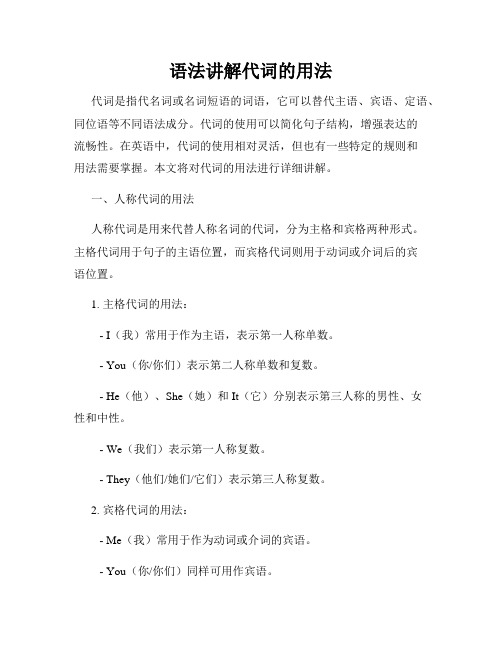
语法讲解代词的用法代词是指代名词或名词短语的词语,它可以替代主语、宾语、定语、同位语等不同语法成分。
代词的使用可以简化句子结构,增强表达的流畅性。
在英语中,代词的使用相对灵活,但也有一些特定的规则和用法需要掌握。
本文将对代词的用法进行详细讲解。
一、人称代词的用法人称代词是用来代替人称名词的代词,分为主格和宾格两种形式。
主格代词用于句子的主语位置,而宾格代词则用于动词或介词后的宾语位置。
1. 主格代词的用法:- I(我)常用于作为主语,表示第一人称单数。
- You(你/你们)表示第二人称单数和复数。
- He(他)、She(她)和It(它)分别表示第三人称的男性、女性和中性。
- We(我们)表示第一人称复数。
- They(他们/她们/它们)表示第三人称复数。
2. 宾格代词的用法:- Me(我)常用于作为动词或介词的宾语。
- You(你/你们)同样可用作宾语。
- Him(他)、Her(她)和It(它)分别用作第三人称的男性、女性和中性宾语。
- Us(我们)用作第一人称复数宾语。
- Them(他们/她们/它们)用作第三人称复数宾语。
二、指示代词的用法指示代词用于指示或代指句子中的名词或名词短语。
常见的指示代词有this(这个)、that(那个)、these(这些)、those(那些)。
1. This(这个)和These(这些)用于指代近处的人或物。
- This is my car.(这是我的车。
)- These are my books.(这些是我的书。
)2. That(那个)和Those(那些)用于指代远处的人或物。
- That is his house.(那是他的房子。
)- Those are our bicycles.(那些是我们的自行车。
)三、反身代词的用法反身代词用于强调句子中的主语,同时也表示主语自身做了某种动作或承受了某种影响。
常见的反身代词有myself(我自己)、yourself (你自己/你们自己)、himself(他自己)、herself(她自己)、itself (它自己)以及ourselves(我们自己)、yourselves(你们自己)、themselves(他们自己/她们自己/它们自己)。
初中英语语法-代词讲解
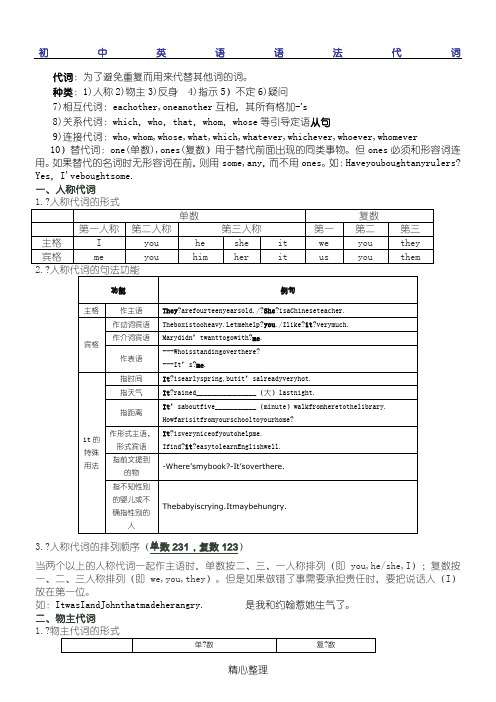
初中英语语法代词代词:为了避免重复而用来代替其他词的词。
种类:1)人称2)物主3)反身4)指示5)不定6)疑问7)相互代词:eachother,oneanother互相,其所有格加-’s8)关系代词:which,who,that,whom,whose等引导定语从句9)连接代词:who,whom,whose,what,which,whatever,whichever,whoever,whomever10)替代词:one(单数),ones(复数)用于替代前面出现的同类事物。
但ones必须和形容词连用。
如果替代的名词时无形容词在前,则用some,any,而不用ones。
如:Haveyouboughtanyrulers? Yes,I'veboughtsome.3.?人称代词的排列顺序(单数231,复数123)当两个以上的人称代词一起作主语时,单数按二、三、一人称排列(即you,he/she,I);复数按一、二、三人称排列(即we,you,they)。
但是如果做错了事需要承担责任时,要把说话人(I)放在第一位。
如:ItwasIandJohnthatmadeherangry. 是我和约翰惹她生气了。
二、物主代词1.???①?helponeselfto随便吃……???②?cometooneself苏醒过来,醒悟,恢复知觉??③?dressoneself自己穿衣服??④?saytooneself自言自语??⑤?enjoyoneself玩得开心??⑥?loseoneselfin迷路于,全神贯注于…之中,消失于??⑦?teachoneself自学???⑧?lookafteroneself⑨byoneself亲自learn……byoneself自学…leaveonebyoneself把某人单独留下hurtoneself伤了自己makeyourself/yourselvesathome不必拘束四、指示代词1.that用来代替前面提到的不可数名词,those代替复数名词。
初中英语语法-代词

初中英语语法——代词一.代词的分类人称代词物主代词反身代词不定代词指示代词疑问代词人称代词:They all like him very much.他们都很喜欢他。
She gave the books to you and me.这些书是她送给你和我的。
2. 人称代词在作表语时,用宾格——Who’s knocking at the door?——It’s me.谁敲门?-是我。
3. 人称代词在并列使用时的顺序为“第二人称,第三人称,第一人称”You, she and I all enjoy the music.你我她都喜欢音乐。
4. she可以用来代表国家、船只、大地、月亮等We love our motherland, we hope she’ll be stronger and bigger.我们热爱我们的祖国,我们希望她更强大。
The ship is leaving. She’s on her first trip to Boston.轮船要起航了。
这是她第一次去波士顿。
5. it作为人称代词时,可以表示天气、距离、时间、环境等——What’the weather like today?——It’s windy.今天的天气怎么样?- 有风。
It’s about five minutes’walk from home to school.从家到学校的路程大约5分钟。
6. it可作为形式主语,将不定式、动名词等构成的主语后移,使句子显得平稳It’s hard to reach the apples.很难够到苹果。
It’s good for you taking a walk after supper.对你来说饭后散步是有好处的。
物主代词形容词性名词性my mineyour yourshis hisher hersits itsour oursyour yourstheir theirs1. 形容词性物主代词在句中只能作定语My brother is a worker.我弟弟是个工人。
英语语法详解-代词
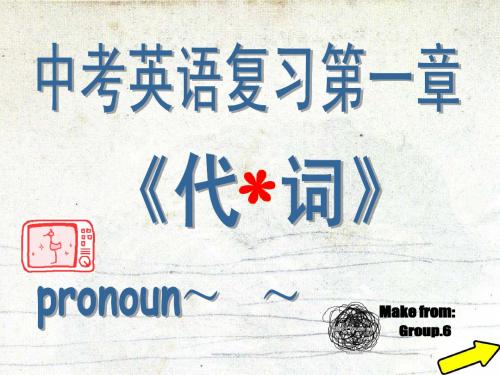
2. (08广州)
Miss Green didn’t talk much to other people.
There was always ____ a little D sad about her. A.everything B.anything C.nothing D.something
1.(襄樊市· 2006)
Mary’s answer is different from_____ , but I really agree A with_____.
A.his ; her C.him ; hers B.his ; hers D.him ; hers
2.(辽宁沈阳· 2008)
--- Where’s Mrs Li taking Polly and Mickey?
单数形式:
(2.3.1) you,he and I
复数形式: (1.2.3) we,you and they
练习:
B (2007内蒙古)____have a lot of work to do?
A. He,you and I
B. You,he and I C. I, you and he D. I ,he and you
例: 1.This is my doll.
= This doll is mine.
2. Our house is here, and theirs is there. 3. ---Whose car is this? ---It’s hers. (= her bike.)
初中英语语法-代词讲解
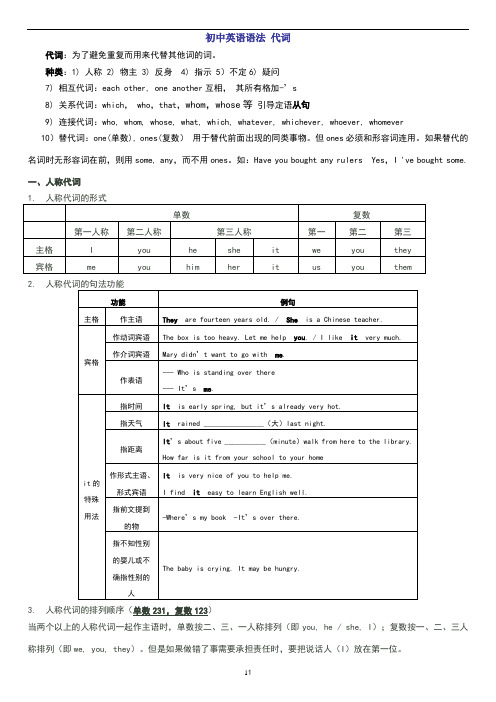
初中英语语法代词代词:为了避免重复而用来代替其他词的词。
种类:1) 人称 2) 物主 3) 反身4) 指示 5)不定6) 疑问7) 相互代词:each other, one another互相,其所有格加-’s8) 关系代词:which, who,that,whom,whose等引导定语从句9) 连接代词:who, whom, whose, what, which, whatever, whichever, whoever, whomever10)替代词:one(单数), ones(复数)用于替代前面出现的同类事物。
但ones必须和形容词连用。
如果替代的名词时无形容词在前,则用some, any,而不用ones。
如:Have you bought any rulers Yes,I 've bought some.一、人称代词2.3. 人称代词的排列顺序(单数231,复数123)当两个以上的人称代词一起作主语时,单数按二、三、一人称排列(即you, he / she, I);复数按一、二、三人称排列(即we, you, they)。
但是如果做错了事需要承担责任时,要把说话人(I)放在第一位。
如:It was I and John that made her angry. 是我和约翰惹她生气了。
二、物主代词1. 物主代词的形式3. 物主代词的特殊用法在双重所有格中只能用名词性物主代词。
如:我的一个朋友a friend of mine , 她的一个同学 a classmate of hers , each brother of his.三、反身代词1. 反身代词的形式2. 反身代词的句法功能3.由反身代词构成的习惯用语①help oneself to 随便吃……②come to oneself 苏醒过来,醒悟,恢复知觉③dress oneself 自己穿衣服④say to oneself 自言自语⑤enjoy oneself 玩得开心⑥lose oneself in迷路于,全神贯注于…之中,消失于⑦teach oneself 自学⑧look after oneself ⑨by oneself 亲自learn……by oneself 自学…leave one by oneself 把某人单独留下hurt oneself 伤了自己make yourself/yourselves at home 不必拘束四、指示代词1. that 用来代替前面提到的不可数名词,those代替复数名词。
英语语法-代词
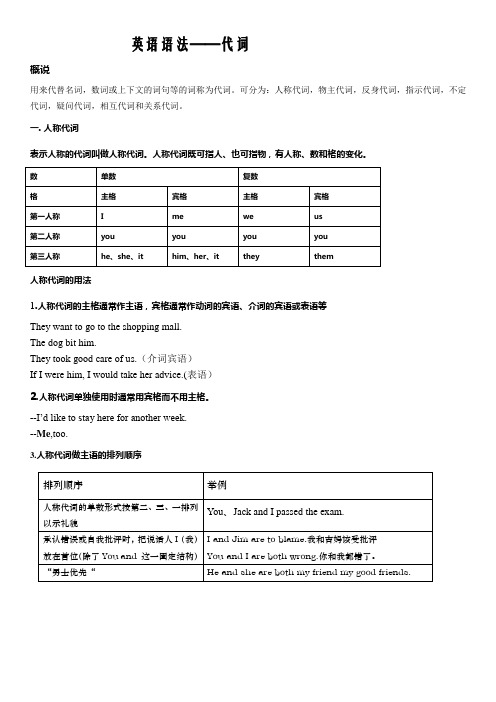
英语语法——代词概说用来代替名词,数词或上下文的词句等的词称为代词。
可分为:人称代词,物主代词,反身代词,指示代词,不定代词,疑问代词,相互代词和关系代词。
一.人称代词表示人称的代词叫做人称代词。
人称代词既可指人、也可指物,有人称、数和格的变化。
人称代词的用法1.人称代词的主格通常作主语,宾格通常作动词的宾语、介词的宾语或表语等They want to go to the shopping mall.The dog bit him.They took good care of us.(介词宾语)If I were him, I would take her advice.(表语)2.人称代词单独使用时通常用宾格而不用主格。
--I’d like to stay here for another week.--Me,too.3.人称代词做主语的排列顺序二.物主代词表示所有关系的代词叫做物主代词,分为形容词性物主代词和名词性物主代词。
1.形容词性物主代词用法:可作定语相当于形容词I love my work in the hospital.2.名词性物主代词=形容词性物主代词+名词,可用作主语、宾语和表语Ours is a socialist country.I didn't borrow her dictionary. I borrowed his.Whose pencil is this?-It is hers.She is a friend of mine=She is a friend of my friends.三.反身代词表示主语发出的动作反射到施动者本身。
用法:1.在句中作宾语,表语,同位语Please help yourself to some lea.The girl is too young to look after herself.You will be yourself again soon.Bob is not himself today.2.在句中作名词或代词的同位语,用来加强名词或代词的语气,作"亲自"、"本人"解。
英语语法代词讲解
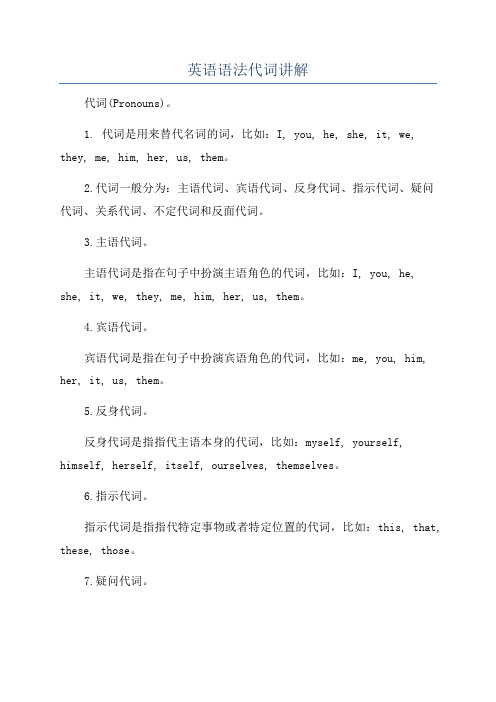
英语语法代词讲解代词(Pronouns)。
1. 代词是用来替代名词的词,比如:I, you, he, she, it, we, they, me, him, her, us, them。
2.代词一般分为:主语代词、宾语代词、反身代词、指示代词、疑问代词、关系代词、不定代词和反面代词。
3.主语代词。
主语代词是指在句子中扮演主语角色的代词,比如:I, you, he, she, it, we, they, me, him, her, us, them。
4.宾语代词。
宾语代词是指在句子中扮演宾语角色的代词,比如:me, you, him, her, it, us, them。
5.反身代词。
反身代词是指指代主语本身的代词,比如:myself, yourself, himself, herself, itself, ourselves, themselves。
6.指示代词。
指示代词是指指代特定事物或者特定位置的代词,比如:this, that, these, those。
7.疑问代词。
疑问代词是指用来引导疑问句的代词,比如:who, whom, which, what, whose。
8.关系代词。
关系代词是指指代一个句子中某一元素的代词,比如:who, whom, that, which, whose。
9.不定代词。
不定代词是指不指代特定的事物的代词,比如:anyone, anything, everyone, everything, nobody, nothing, somebody, something。
10.反面代词。
反面代词是指强调对前面的否定意思的代词,比如:neither, none, nobody, no one, nothing。
初中英语语法精讲--代词
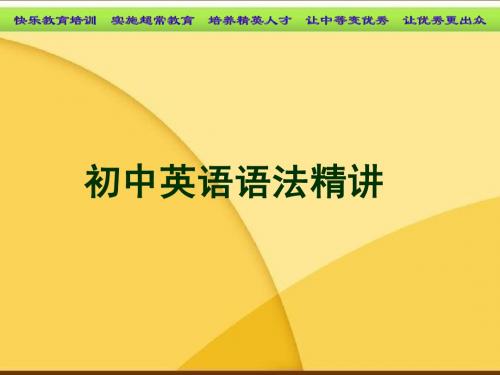
格
主格
they you 他们,她们, 你们 它们 you 你们 them
宾格
他们,她们, 它们
1、主格用来作句子的主语、表语。如: I often go shopping on Sundays. 星期天我常去购物。 Are they from Brazil? 他们是巴西人吗? Where have they gone? 他们上哪儿去了? That’s it. 就那么回事。 It’s he代词的分类:英语中代词分为:
人称代词 personal pronouns
物主代词 possessive pronouns 反身代词 self pronouns
指示代词 demonstrative pronouns
关系代词 relative pronouns 疑问代词 interrogative pronouns 连接代词 conjunctives 不定代词 indefinite pronouns
2、人称代词:人称代词代替人和事物的名称,分为主格和
宾格两种形式。
第一人 第二人 称单数 称单数 I 我 me 我 you 你 you 你 阳性 he 他 him 他 第三人单数 阴性 she 她 her 她 中性 it 它 it 她 第一人 第二人 称复数 称复数 we 我们 us 我们 第三人 称复数
小学英语基础语法2-代词

小学英语基础语法—代词代词(Pronoun):就是用来代替名词的词。
如:表示“你”、“我”、“他”、“这”、“那”等的词就是代词。
英语中的代词通常可分为:人称代词(personal pronouns)、物主代词(possessive pronouns)、指示代词(demonstrative pronouns)等类型。
一、人称代词(Personal Pronouns)英语中,像I,he,she,we,it,you等指代人称的词被称作人称代词。
用来替代主语位置上的名词。
根据人称关系可分为第一人称代词、第二人称代词和第三人称代词。
第一人称代词有I和we两个,I意思是“我”,表示单数,we意思是“我们”,表示复数。
第二人称代词只有you一个,意思是“你”或“你们”,既可以表示单数,又可以表示复数。
第三人称代词有四个,分别是he,she,it和they。
he用来指代“他”,she用来指代“她”,it用来指代“它”,均表示单数。
they用来指代“他们”、“它们”或“她们”,表示复数。
人称代词的单复数可以总结为下面的表格:人称代词的宾格:英语中像me,you(你),him,her,it,us,you(你们),them这些词也是人称代词。
它们一般放在动词的后面做宾语。
一般情况下,主语出现在句首,而宾语出现在句中或句尾。
例如:I hide in the garden. Can you find me?这句中的me就是主语I 的宾格,在句中作宾语。
所有人称代词都有相应的主格和宾格形式。
我们可以把人称代词的主格和宾格归纳总结为下面的表格:二、物主代词(Possessive Pronoun)在汉语中我们经常会用到“我的”、“你的”、“他的”等词,在英语中所对应的这类词就是物主代词。
每一个人称代词都有相对应的物主代词。
例如I的物主代词就是my,它常出现在名词的前面,表示“我的……”。
同样,其他物主代词的用法跟my相同,也是出现在名词的前面,表示相应名词的所属关系。
初中英语语法大全 之 代词部分
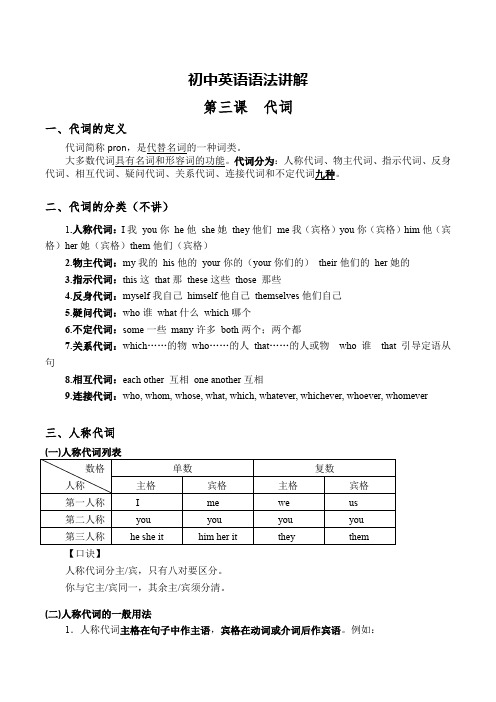
初中英语语法讲解第三课代词一、代词的定义代词简称pron,是代替名词的一种词类。
大多数代词具有名词和形容词的功能。
代词分为:人称代词、物主代词、指示代词、反身代词、相互代词、疑问代词、关系代词、连接代词和不定代词九种。
二、代词的分类(不讲)1.人称代词:I我you你he他she她they他们me我(宾格)you你(宾格)him他(宾格)her她(宾格)them他们(宾格)2.物主代词:my我的his他的your你的(your你们的)their他们的her她的3.指示代词:this这that那these这些those 那些4.反身代词:myself我自己himself他自己themselves他们自己5.疑问代词:who谁what什么which哪个6.不定代词:some一些many许多both两个;两个都7.关系代词:which……的物who……的人that……的人或物who谁that引导定语从句8.相互代词:each other 互相one another互相9.连接代词:who, whom, whose, what, which, whatever, whichever, whoever, whomever三、人称代词【口诀】人称代词分主/宾,只有八对要区分。
你与它主/宾同一,其余主/宾须分清。
(二)人称代词的一般用法1.人称代词主格在句子中作主语,宾格在动词或介词后作宾语。
例如:I like table tennis.(I作主语)Do you know him?(him作宾语)2.(不讲)人称代词还可以作表语。
作表语时用宾格。
例如:—Who is knocking at the door?—It's me.注意:I(我)无论放在句首、句尾还是句中,都要大写。
(三)人称代词的特殊用法【口诀】人称代词主宾格,作用不同莫用错。
主格动前做主语,动词介词后宾格。
单数人称二三一,复数人称一二三(顺序)。
小学英语语法详解---代词
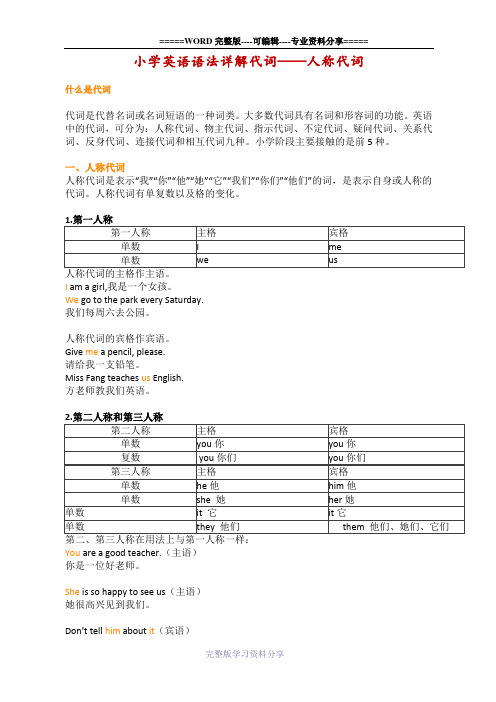
小学英语语法详解代词——人称代词什么是代词代词是代替名词或名词短语的一种词类。
大多数代词具有名词和形容词的功能。
英语中的代词,可分为:人称代词、物主代词、指示代词、不定代词、疑问代词、关系代词、反身代词、连接代词和相互代词九种。
小学阶段主要接触的是前5种。
一、人称代词人称代词是表示“我”“你”“他”“她”“它”“我们”“你们”“他们”的词,是表示自身或人称的代词。
人称代词有单复数以及格的变化。
I am a girl,我是一个女孩。
We go to the park every Saturday.我们每周六去公园。
人称代词的宾格作宾语。
Give me a pencil, please.请给我一支铅笔。
Miss Fang teaches us English.方老师教我们英语。
You are a good teacher.(主语)你是一位好老师。
She is so happy to see us(主语)她很高兴见到我们。
Don’t tell him about it(宾语)不要告诉他这件事情。
It’s a nice present. I like it.(主语和宾语)这是一份很棒的礼物,我超级喜欢。
学习小贴士:●几个人称代词若作为主语连用,一般情况下第一人称I放在最后。
He and I are both students 他和我都是学生。
●it一般表示动物或者没有生命的物体。
但有几种情况下我们也常用it,比如说:①表示婴儿。
Look at the baby. It’s so cute.看那个婴儿,他真可爱。
②表示不清楚的状况。
Who is it?It’s me.谁在敲门,是我。
小学英语语法详解代词——物主代词二、物主代词表示所有关系的代词叫做物主代词。
物主代词可分为形容词性物主代词和名词性物主可用作定语,相当于形容词I love my country,我热爱我的国家。
Is this your car?这是你的汽车吗?2.名词性物主代词可用作主语、宾语、表语以及与"of”连接的定语,在句子里的作用相当于名词。
小学英语语法讲解:代词

小学英语语法讲解:代词
A、人称代词和物主代词
1、人称代词主格和宾格的区别:主格通常位于句中第一个动词之前(有时候位于than 之后),宾格一般位于动词或介词之后。
2、物主代词形容词性与名词性的区别:形容词性用时后面一般要带上名词,名词性则单独使用,后面不带名词。
人称代词物主代词
主格宾格形容词性名词性
我 I me 我的 my mine
你,你们 you you 你(们)的, your yours
他 he him 他的 his his
她 she her 她的 her hers
它 it it 它的 its its
我们 we us 我们的 our ours
他们 they them 他们的 their theirs
B、不定代词Some 与 Any
some和any都有"一些"的含义,都能修饰可数名词和不可数名词,但 some 一般用在肯定句中。
如: There are some girls in the classroom.
some有时也用于疑问句,表示期望得到肯定回答,并不表示对某事有疑问。
如: Can I ask you some questions ?
any一般用于疑问句和否定句中。
如: Are there any maps on the wall? 墙上有地图吗?
There aren't any trees behind the house. 房子后面没有树。
- 1、下载文档前请自行甄别文档内容的完整性,平台不提供额外的编辑、内容补充、找答案等附加服务。
- 2、"仅部分预览"的文档,不可在线预览部分如存在完整性等问题,可反馈申请退款(可完整预览的文档不适用该条件!)。
- 3、如文档侵犯您的权益,请联系客服反馈,我们会尽快为您处理(人工客服工作时间:9:00-18:30)。
2) 先行项为某些并列结构时代词的选择: 根据该并列结构的单、复数意义来决定代词以 及相应限定词的单、复数形式: My friend and roommate has agreed to lend me his car. My friend and my roommate have agreed to lend me their cars.
代词及其先行项的“性”的一致: 阳性masculine gender—man, father, son, husband 阴性feminine gender—woman, mother, daughter, wife 中性neutral gender—book, desk, ship, car 通性common gender—student, teacher, doctor, infant 现代英语的代词体系包含了“性”的标记:单 数第三人称代词、物主代词、反身代词以及相 应的限定词。使用时要与先行项保持“性”的 一致。
注意: 1. 先行项为every-, some-等复合词时代词的选择: 1) 当先行词为 everyone, everybody, no one, nobody, anyone, anybody, someone, somebody 等复合词时,代词及相应的限定词通常按照语法一致原则用单数形式。 Anybody can attend the meeting if he is interested. Everybody talked at the top of his voice. If anyone calls, tell him I’ll be back later. 但是,非正式语体中,也可以根据意义一致的原则,用复数代词: Someone left their umbrella behind yesterday. Would they please collect it from the office? If anybody wants to give their name for the trip to Scotland, will they please do it before lunchtime? No one could have blamed themselves for that. 尤其当先行项为everybody, everyone时,其后用复数代词还比较自然。 Everyone was clapping their hands. Did everybody leave the dance early because they weren’t enjoying themselves? 当先行项为everything, anything, something, nothing时,随后的代词以及相应的 限定词一般只按语法一致原则用单数形式: Anything on the table can be thrown away, can’t it?
人称代词、物主代词、反身代词以及相应的限定 词及其先行项(antecedent)在 数(number) 性(gender) 人称(person) 方面的一致关系: 代词及其先行项“数”的一致: 代词和物主限定词单、复数的选择通常取决于他 们的指代对象,即先行项的单、复数形式。 One must remember to remain very still when one/he attends a concert. Professor Smith and I went to the States together. We stayed there for three weeks.
1. 先行项为阳性或阴性名词时代词的选择:代词以及相应的限定词分别用阳性或阴性。 The boy is the brightest in the class. All the teachers like him. Mother is not quite herself today. She may have caught a cold. James Collins plans to open his own office in Fresno. He went there last week. Tom Ruth Davis Susan Ally Amy Barney Beck Benny Carmen Cecily Doyle Emile Frances Giles Gill Hallis Holly Ira Ina
英语语法讲解 代词(Pronoun)
概说
代词的分九类: 人称代词—personal pronouns 物主代词—possessive pronouns 反身代词—reflexive pronouns 相互代词—reciprocal pronouns 指示代词—demonstrative pronouns 疑问代词—interrogative pronouns 关系代词—relative pronouns 不定代词—indefinite pronouns 连接代词—conjunctive pronouns 来自
2. 先行项为通性名词时代词的选择: 通性名词baby, child, infant, doctor, patient, lawyer, engineer, teacher, student, scholar, speaker, scientist, customer, parent, person男女均可。当这类名词以其单数形式表示类指(generic reference) 时,通常用阳性单词或相应的限定词来指代: An instructor should offer his students challenging projects. 避免性别歧视:改用复数,或者避免使用代词或限定词。 Instructors should offer their students challenging projects. An instructor should offer challenging projects to the students. 法律文书等正式语体中,还可用he or she, his or her来指代单数通性名词: An instructor should offer his or her students challenging projects. 但是,除了法律文书外,he or she, his or her不宜多次出现、重复,违背简练原则,也可以改用复 数代词或者避免使用代词: Parents of a teenage child often wonder where he or she went wrong. Parents of teenage children often wonder where they went wrong. When a customer calls, ask him or her to leave his or her phone number. When a customer calls, be sure to ask for a phone number. 当先行项为baby, child, infant等通性名词而说话人不知其性别,或者不必过问其性别时,用中性代 词it;如果说话人知其性别,则根据孩子的性别来选代词: There’s a baby in the pram. Why, it’s crying. Baby is crying in the pram. She must be hungry. 当通性名词表示特指含义时,随后的代词以及相应的限定词须根据上下文所表示的具体性别选用适 当的形式: In her lifetime, Catherine worked day and night without thinking of her personal comfort. The doctor will forever live in the hearts of her patients. A student at Barnard College has to do her own work.
3.先行项为中性名词时代词的选择:通常用中性(it, its, itself). That book has lots its cover. I will put a new one on it tomorrow. The machine works by itself. 带感情色彩也可以用阴性或阳性代词来指代中性物: The sailor saw a ship in the distance. She was sailing toward the rocky island. How’s your new car? Terrific. She’s going like a bomb. The car needs some petrol. Let’s fill him up at the next filling station. (女性主人) 如果先行项为动物名称,通常用中性代词来指代,但是带感情色彩,或者把动物拟人化,可以用阳 性或阴性代词: Look at that bird. It always comes to my window. The cat leaped onto my bed and coiled herself there. The blackbird rushed away to the bush, where he remained perching for about a minute. 当先行项为表示天体名称或某些抽象概念名词时,代词或相应的限定词用中性,带感情色彩或者拟 人化,也可以用he 或she,依习惯而定。 The sun is shining in all his splendid beauty. Love begins playing his old tricks every spring. History has revised her verdict. The Autumn gave golden fruit to every garden, but to the giant’s garden she gave nothing. 当先行项为国家名称时,如果仅视为地理名词,代词或相应限定词用中性,但若视为政治实体或者 说话人带感情色彩,代词或相应限定词用阴性: China is in East Asia. It is one of the largest countries in the world. In the last decade of the 20th century, China began to assume her role as a world power. P90 exercises
